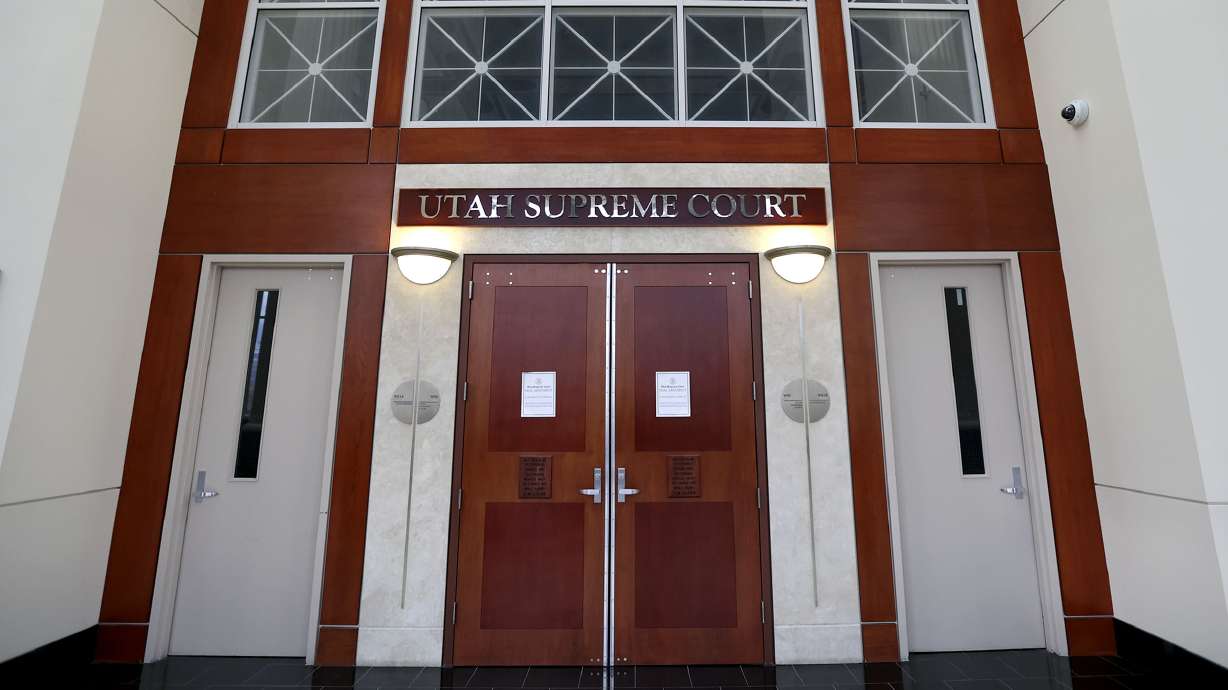Estimated read time: 4-5 minutes
This archived news story is available only for your personal, non-commercial use. Information in the story may be outdated or superseded by additional information. Reading or replaying the story in its archived form does not constitute a republication of the story.
SALT LAKE CITY — The Utah Supreme Court will decide a constitutional climate case filed by a youth advocacy group.
Natalie R. v. State of Utah was filed by Our Children's Trust, a nonprofit public interest law firm that provides campaign-based legal services to youths seeking to "secure their legal rights to a safe climate," according to a news release. The group is working in conjunction with Salt Lake-based law firm Deiss Law PC.
The case argues that state laws directing Utah government agencies to "systematically authorize fossil fuel development" are unconstitutional because they cause dangerous air pollution and climate change in Utah, "taking years off the youths' lives and substantially endangering their health and safety," according to the release.
But 3rd District Court Judge Robert Faust dismissed the case in November, writing in his decision that the plaintiffs "have a valid concern" but that the court doesn't have the power to hear the case. He granted the state's motion to dismiss.
"Neither Utah's Constitution, nor the United States Constitution, addresses anything about fossil fuels or global climate change which would permit the court to grant a judicial remedy," he wrote. "Striking down the Legislature's fossil fuel policies would be contrary to our constitutional system and violate the separation of powers."
The Utah Supreme Court retained Natalie R. v. State of Utah on March 10, nearly one year to the day since it was initially filed in 3rd District Court. Andrew Welle, lead attorney for the case, said the case hasn't yet been scheduled for argument.
The court's acceptance of the case means the issue will now be decided directly by the Utah Supreme Court, rather than the Utah Court of Appeals, the news release states.
The plaintiffs are six minors and their guardians, along with one adult. The defendants are the state of Utah, Gov. Spencer Cox, and several individuals and offices associated with the Department of Natural Resources.
"We're encouraged that the Utah Supreme Court recognizes the importance of this appeal and we're hopeful that the court will set this urgent case back on track for trial," Welle said in a statement. "Every day that Utah's statutory policy to maximize fossil fuel development remains in place exposes these youth to increasing air pollution and worsening climate change, taking years off of their lives and significantly endangering their health and safety."
The original complaint outlines Utah's "unconstitutional" fuel development policies and the ways in which they allegedly harm the plaintiffs.
One of the minors is "frequently" exposed to dangerous air quality throughout the year, it states, meaning she often has to wear masks outside and experiences painful headaches due to the air. She also experiences dizziness and feels like she's going to pass out when skiing or when competing on her school's track and cross-country team.
"She has often experienced such poor air quality that she has been unable to see down her own street," the complaint states. "Air quality is often so dangerous that her school will require her and her friends to stay indoors."
Another minor named as a plaintiff was diagnosed with asthma as a baby, the complaint continues, and needed nebulizer treatments several times a week or even several times a day. By the time she was 3, she needed daily steroid treatments for her asthma, which continues.
Her family moved to a higher elevation on a doctor's recommendation, but she still takes daily medication and must often stay indoors due to Utah's "hazardous" air quality.
The complaint lists the statutory provisions codified in the defendants' Fossil Fuel Development Policy, "causing the dangerous air pollution harming youth plaintiffs."
- Utah Code sections 40-10-1(1) and 40-10-17(2)(a), which call for insuring "the existence of an expanding and economically healthy underground coal mining industry" and "maximization, promotion and systematic authorization of coal development."
- Utah Code sections 40-6-1 and 40-6-13, which also call for the "maximization, promotion and systematic authorization of oil and gas development."
- Utah Code section 79-6-301(1)(b)(i) states that it is Utah's policy to "promote the development" of "natural gas, coal, oil, oil shale and oil sands."
But in their response, attorneys for the defendants wrote that the plaintiffs' claims are "unsound" because they attempt to create a new "fundamental right" to a healthy environment.
The plaintiffs include a healthy environment in their definition of the right to life, they continue, but "there is nothing about fossil fuel use that offends the concept of ordered liberty."
Additionally, defense attorneys wrote, the plaintiffs gave no indication of what policy — short of a complete ban on fossil fuels — would be constitutional. The plaintiffs also didn't present a "judicially manageable" standard for fossil fuel use violations, instead arguing only that present emissions exceed what is constitutional.
"Dismissal (of the complaint) ... is proper because no fundamental right to a clean environment has ever been recognized," the response states. "This court should not be the first to do so."
Correction: An earlier version incorrectly named Our Children's Trust and Deiss Law PC as plaintiffs instead of law firms representing the plaintiffs.










